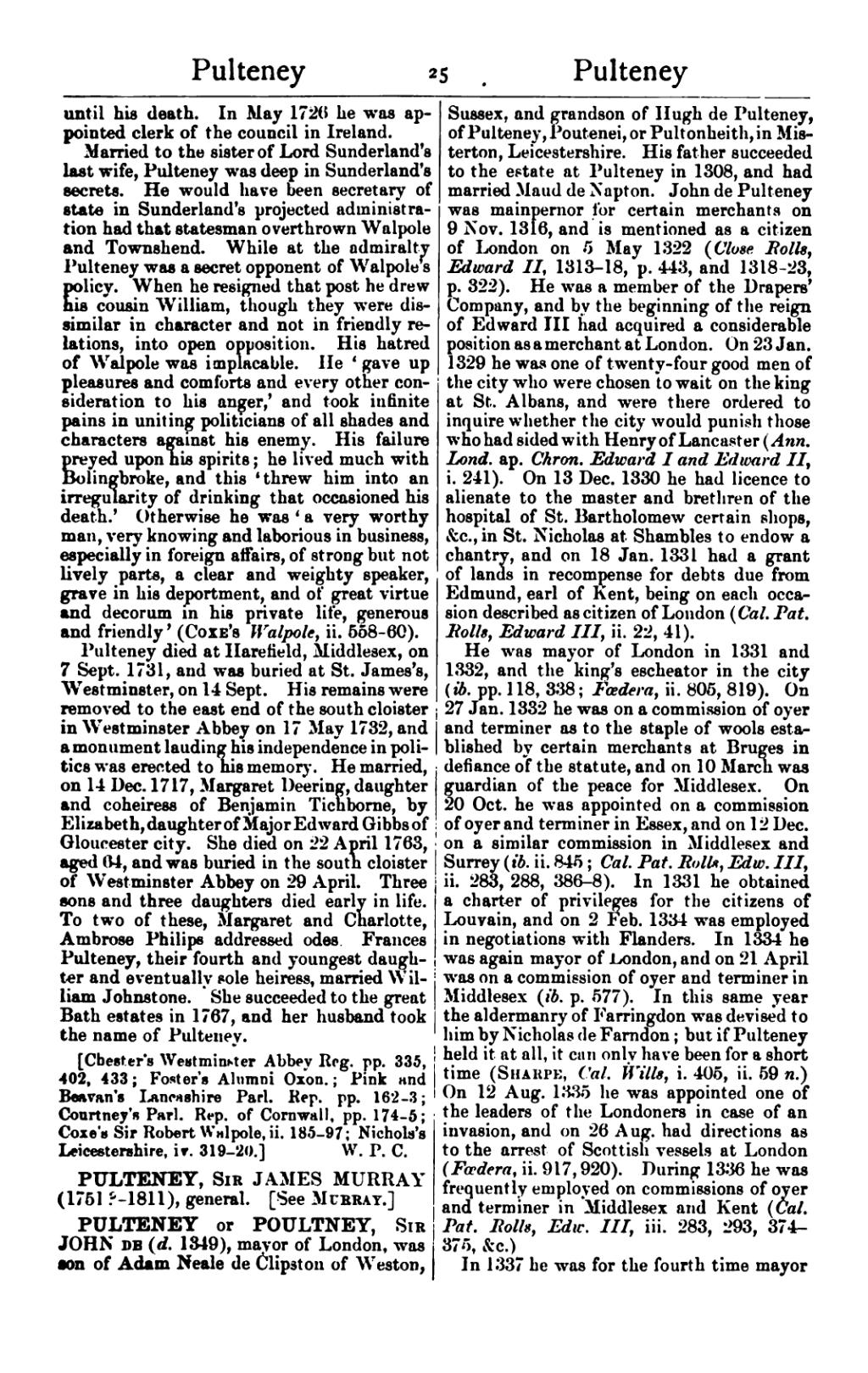until his death. In May 1726 he was appointed clerk of the council in Ireland.
Married to the sister of Lord Sunderland's last wife, Pulteney was deep in Sunderland's secrets. He would have been secretary of state in Sunderland's projected administration had that statesman overthrown Walpole and Townshend. While at the admiralty Pulteney was a secret opponent of Walpole's policy. When he resigned that post he drew his cousin William, though they were dissimilar in character and not in friendly relations, into open opposition. His hatred of Walpole was implacable. He ‘gave up pleasures and comforts and every other consideration to his anger,’ and took infinite pains in uniting politicians of all shades and characters against his enemy. His failure preyed upon his spirits; he lived much with Bolingbroke, and this ‘threw him into an irregularity of drinking that occasioned his death.’ Otherwise he was ‘a very worthy man, very knowing and laborious in business, especially in foreign affairs, of strong but not lively parts, a clear and weighty speaker, grave in his deportment, and of great virtue and decorum in his private life, generous and friendly’ (Coxe's, Walpole, ii. 558–60).
Pulteney died at Harefield, Middlesex, on 7 Sept. 1731, and was buried at St. James's, Westminster, on 14 Sept. His remains were removed to the east end of the south cloister in Westminster Abbey on 17 May 1732, and a monument lauding his independence in politics was erected to his memory. He married, on 14 Dec. 1717, Margaret Deering, daughter and coheiress of Benjamin Tichborne, by Elizabeth, daughter of Major Edward Gibbs of Gloucester city. She died on 22 April 1763, aged 64, and was buried in the south cloister of Westminster Abbey on 29 April. Three sons and three daughters died early in life. To two of these, Margaret and Charlotte, Ambrose Philips addressed odes. Frances Pulteney, their fourth and youngest daughter and eventually sole heiress, married William Johnstone. She succeeded to the great Bath estates in 1767, and her husband took the name of Pulteney.
[Chester's Westminster Abbey Reg. pp. 335, 402, 433; Foster's Alumni Oxon.; Pink and Beavan's Lancashire Parl. Rep. pp. 162–3; Courtney's Parl. Rep. of Cornwall, pp. 174–5; Coxe's Sir Robert Walpole, ii. 185–97; Nichols's Leicestershire, iv. 319–20.]
PULTENEY, Sir JAMES MURRAY (1751?–1811), general. [See Murray.]
PULTENEY or POULTNEY, Sir JOHN de (d. 1349), mayor of London, was son of Adam Neale de Clipston of Weston, Sussex, and grandson of Hugh de Pulteney, of Pulteney, Poutenei, or Pultonheith, in Misterton, Leicestershire. His father succeeded to the estate at Pulteney in 1308, and had married Maud de Napton. John de Pulteney was mainpernor for certain merchants on 9 Nov. 1316, and is mentioned as a citizen of London on 5 May 1322 (Close Rolls, Edward II, 1313–18, p. 443, and 1318–23, p. 322). He was a member of the Drapers' Company, and by the beginning of the reign of Edward III had acquired a considerable position as a merchant at London. On 23 Jan. 1329 he was one of twenty-four good men of the city who were chosen to wait on the king at St. Albans, and were there ordered to inquire whether the city would punish those who had sided with Henry of Lancaster (Ann. Lond. ap. Chron. Edward I and Edward II, i. 241). On 13 Dec. 1330 he had licence to alienate to the master and brethren of the hospital of St. Bartholomew certain shops, &c., in St. Nicholas at Shambles to endow a chantry, and on 18 Jan. 1331 had a grant of lands in recompense for debts due from Edmund, earl of Kent, being on each occasion described as citizen of London (Cal. Pat. Rolls, Edward III, ii. 22, 41).
He was mayor of London in 1331 and 1332, and the king's escheator in the city (ib. pp. 118, 338; Fœdera, ii. 805, 819). On 27 Jan. 1332 he was on a commission of oyer and terminer as to the staple of wools established by certain merchants at Bruges in defiance of the statute, and on 10 March was guardian of the peace for Middlesex. On 20 Oct. he was appointed on a commission of oyer and terminer in Essex, and on 12 Dec. on a similar commission in Middlesex and Surrey (ib. ii. 845; Cal. Pat. Rolls, Edw. III, ii. 283, 288, 386–8). In 1331 he obtained a charter of privileges for the citizens of Louvain, and on 2 Feb. 1334 was employed in negotiations with Flanders. In 1334 he was again mayor of London, and on 21 April was on a commission of oyer and terminer in Middlesex (ib. p. 577). In this same year the aldermanry of Farringdon was devised to him by Nicholas de Farndon; but if Pulteney held it at all, it can only have been for a short time (Sharpe, Cal. Wills, i. 405, ii. 59 n.) On 12 Aug. 1335 he was appointed one of the leaders of the Londoners in case of an invasion, and on 26 Aug. had directions as to the arrest of Scottish vessels at London (Fœdera, ii. 917, 920). During 1336 he was frequently employed on commissions of oyer and terminer in Middlesex and Kent (Cal. Pat. Rolls, Edw. III, iii. 283, 293, 374–375, &c.).
In 1337 he was for the fourth time mayor
